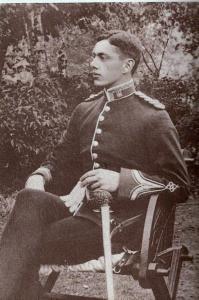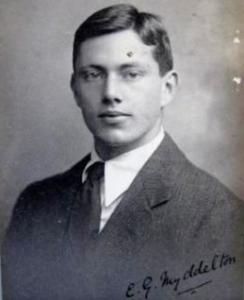
|

|
| 2nd Lieutenant Edward Geoffrey MYDDELTON | |
|
3rd (Reserve) Battalion Suffolk Regiment attached to 15 Platoon, C Company, 2nd Battalion Date of birth: 22nd August 1893 Date of death: 26th August 1914 Killed in action aged 21 Commemorated on the La Ferte-Sous-Jouarre Memorial |

|
| Edward Geoffrey Myddelton was born at Boston in Lincolnshire on the 22nd of August 1893 the second son of Edward Brackenbury Myddelton, a bank manager, and Sarah, (nee Harwood) Myddelton of "Oakhurst", Woodhall Spa, Wellingborough in Northamptonshire. He was educated at Wellingborough School in Northamptonshire and at Lancing College where he was in Seconds House from September 1909 to April 1910 when he left due to ill health. In 1912 he went on to Jesus College Cambridge as a Foundation Scholar where he took first class honours in the first part of his Mathematical Tripos and was to have taken the second part in the Easter term of 1915. He rowed for his College as No. 5 in the 3rd Boat in the Lent term of 1914 and was a member of the "Roosters", the Jesus College Debating Society. He was a member of the Cambridge University Officer Training Corps and was commissioned as a 2nd Lieutenant in the Special Reserve of Officers for the Middlesex Regiment on the 4th of June 1913. On the outbreak of war he was mobilised and was attached to 15 Platoon, C Company, 2nd Battalion Suffolk Regiment for active service and joined them in Dublin. The Battalion sailed for France in two groups on board the SS “Lanfranc” on the 13th of August and on the SS “Poland” which sailed the following day. He landed at Le Havre on the 15th of August 1914 which suggests he was on the former vessel. By the 23rd of August the battalion had engaged the Germans at Mons and were forced to retreat along with the rest of the British forces when the Germans broke through their lines. They fell back to Le Cateau where it was decided a stand would be made to allow the bulk of the British forces to make good their escape. An order was issued by General Horace Smith- Dorrian that under no circumstances were the Suffolks to retire. On the morning of the 26th of August 1914 the Suffolks found themselves in a very poor defensive position to the west of Le Cateau. Their field of fire was limited, with dead ground all around them, allowing any attackers to advance on them unmolested. At 6am, 15 Platoon, under Myddelton opened fire on an Uhlan patrol and when Major Peebles, the commander of D Company, went forward to do a personal reconnaissance he found the dead body of an Uhlan officer. The morning passed with a few enemy patrols being seen. 15 Platoon had flattened down the corn stalks around them and dug some shallow trenches when one of the German guns opened fire. The second shell landed in the middle of the platoon killing Edward Myddelton and his Platoon Sergeant, Sergeant W. Molineaux. Peebles then withdrew the survivors back to the main position. His father received the following telegram:- "Deeply regret to inform you that 2 Lieutenant E.G. Myddelton Suffolk Regiment is reported missing." In an attempt to establish what had happened to his son his father wrote to the War Office in a letter dated the 10th of September 1914:- "Dear Sir, Private Hurrell Suffolk Regt, now in Birmingham Hospital, states that he saw Lt. Myddelton wounded by shrapnel on 26th Aug. Have you any confirmation of this?" He received a letter dated the 29th of November 1914 from 4450 Company Sergeant Major W.A. Read, 2nd Battalion Suffolk Regiment who was a prisoner at Gefangen Lager at Doeberitz in Germany:- "Sir, Reference your postcard dated 6th Nov 14 to Pte Patenall enquiring about your son 2nd Lieut. Myddelton, Suffolk Regt. I regret to inform you that he was killed at Le Cateau on the 26th of August 1914. This information has been obtained from the men of his own company. There are 450 Suffolks here and 14 officers at Torgan-a-Elbe." Sergeant Major Crack who was captured during the action wrote from prisoner of war camp at Sennelager on the 15th of January 1915:- “I am very sorry to say that 2nd Lieutenant Myddelton was killed about 12 o’clock on August 26th; also his Platoon Sergeant was killed at the same time, both by the same shrapnel. The men of his platoon were all very much grieved to have lost their leader, as they were all very proud of him.” In December 1915 he received the following letter from Sergeant 5761 W. Woodrow, 2nd Battalion Suffolk Regiment, from Queen Alexandria's Hospital, Millbank where he had recently arrived, having been repatriated by the Germans due to his injuries:- "Dear Sir, I did not actually see your son killed on the morning of the 26 Aug 1914 but when I arrived in Germany I was told by Pte. Cook of the same Bn. that your son and Sgt Molineaux and four Privates were killed right out by a shell. I hope you will excuse this short report as I cannot see very well as I lost my right eye, left eye badly damaged but I am feeling well in health thanking you very much for you most welcome letters. I am very pleased to have arrived home again out of the hands of the Huns to where I am treated well." He was the first OL to lose his life in the Great War. He was officially declared as dead on the 25th of January 1916 and his father applied for his medals in September 1917. He is commemorated on the war memorial at Wellingborough and on the memorial in the chapel at Jesus College Cambridge. Lower photograph reproduced by kind permission of the Master, Fellows and Scholars of Jesus College, Cambridge. |
|
 | |
| Seconds House |
Back